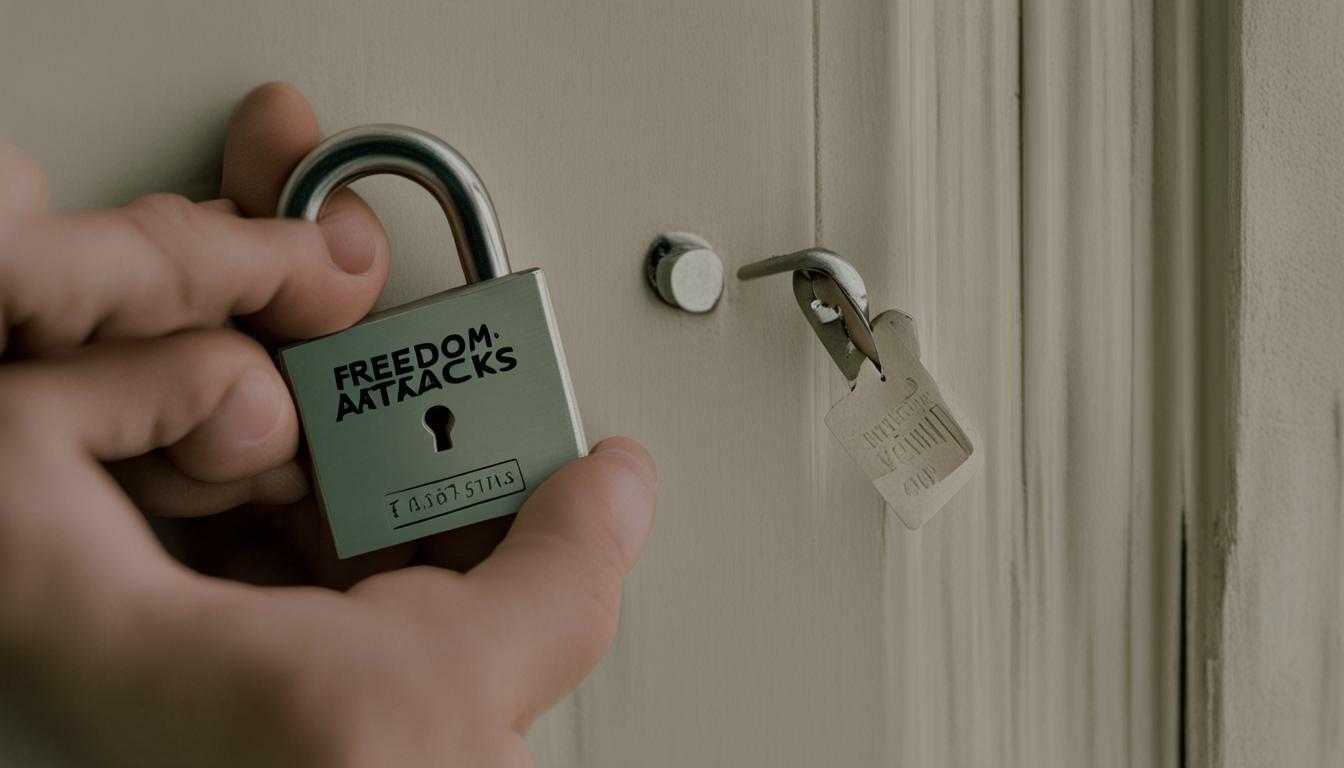Dealing with panic attacks can be a daunting and overwhelming experience. It’s important to know that you are not alone, and there are ways to overcome this challenge. In this article, we will explore various strategies and coping mechanisms that can help you stop panic attacks for good.
If you’re tired of living in fear and uncertainty, and you’re ready to take control of your life, keep reading. We’re here to support you every step of the way.
Key Takeaways:
- Stop panic attacks forever with effective coping mechanisms and lifestyle changes.
- Identify triggers to recognize and prevent future panic attacks.
- Seek professional help and build a support network for long-term relief.
Understanding Panic Attacks
Before we dive into strategies for stopping panic attacks, it’s important to understand what exactly they are. A panic attack is a sudden and intense feeling of fear or discomfort that can be accompanied by physical symptoms.
The signs of a panic attack can include:
- Rapid heart rate
- Sweating
- Trembling or shaking
- Shortness of breath or feeling like you’re choking
- Chest pain or discomfort
- Nausea or stomach discomfort
- Feeling dizzy, lightheaded, or faint
- Numbness or tingling sensations
While panic attacks can be frightening and overwhelming, it’s important to know that they are not dangerous and usually only last for a few minutes. They can be caused by a variety of factors, including:
| Panic Attack Causes |
|---|
| Genetics: Panic attacks can run in families. |
| Stress: High levels of stress can trigger panic attacks. |
| Changes in brain function: Panic attacks can be linked to changes in the way the brain functions. |
| Phobias: Having a specific phobia, such as a fear of flying, can trigger panic attacks in certain situations. |
| Other mental health conditions: Panic attacks can be a symptom of other mental health conditions, such as anxiety disorders or depression. |
By understanding what panic attacks are and what can cause them, we can begin to take steps to manage and prevent them.
Identifying Triggers
When it comes to managing panic attacks, identifying triggers is a crucial step. Triggers are situations, emotions, or physical sensations that can lead to a panic attack. By recognizing and addressing triggers, we can better prevent panic attacks from occurring.
Common triggers for panic attacks include stress, certain fears or phobias, major life changes, and physical sensations such as shortness of breath or a rapid heartbeat. However, triggers can vary from person to person.
It’s important to pay attention to our own unique triggers and recognize when they may be causing us distress. This can involve keeping a journal to track situations that precede panic attacks, or simply taking note of any patterns or recurring feelings.
Once we have identified our triggers, we can begin to develop strategies for managing them. This may involve avoiding certain situations or activities, practicing relaxation techniques, or seeking professional help.
Recognizing triggers is an ongoing process, and it’s important to be patient and persistent in our efforts. By becoming more aware of our triggers and developing coping strategies, we can take control of our panic attacks and move towards a more fulfilling and relaxed life.
Coping Mechanisms for Panic Attacks
Dealing with panic attacks can be incredibly challenging, but there are coping mechanisms that can help manage the symptoms and reduce their impact on your life. Here are some effective strategies to consider:
Breathing exercises
One of the most common symptoms of a panic attack is shortness of breath or hyperventilation. Breathing exercises can help restore normal breathing patterns and calm the mind. Try the 4-7-8 technique: inhale through your nose for 4 seconds, hold your breath for 7 seconds, and exhale slowly through your mouth for 8 seconds. Repeat this cycle for a few minutes, focusing on your breath and nothing else.
Grounding techniques
When you feel like you’re losing control during a panic attack, grounding techniques can help bring you back to reality. Focus on your immediate surroundings and use your senses to anchor yourself. For example, name 5 things you can see, 4 things you can hear, 3 things you can touch, 2 things you can smell, and 1 thing you can taste. This can help distract your mind from the panic and give you a sense of control.
Progressive muscle relaxation
Progressive muscle relaxation involves tensing and releasing different muscle groups in your body, helping to relieve tension and promote relaxation. Start by tensing your toes and holding for a few seconds before releasing. Move up through your body, tensing and releasing each muscle group, from your legs to your core to your arms and face.
There are many other coping mechanisms that may work for you, such as mindfulness meditation or distraction techniques like counting backwards from 100. The key is to find what works best for you and incorporate it into your routine.
Seeking Professional Help
While coping mechanisms and lifestyle changes can be effective for managing panic attacks, seeking professional help can provide additional support and guidance. Therapy for panic attacks can help individuals identify triggers, develop coping strategies, and address underlying psychological issues that may be contributing to their panic attacks.
There are also medications available that can help manage the symptoms of panic attacks, including anti-anxiety medications and antidepressants. These should always be prescribed and monitored by a healthcare professional.
Professional support can come in many forms, including therapy, medication management, and support groups. It is important to find a provider who is knowledgeable about panic attacks and has experience working with individuals who experience them.
Remember, seeking professional help is a sign of strength, not weakness. It takes courage to ask for help when we need it, and doing so can lead to long-term relief from panic attacks and improved overall mental health.
Lifestyle Changes for Long-Term Relief
Managing stress is essential for those looking to find relief from panic attacks. Making healthy lifestyle habits a part of our routine can go a long way towards preventing future panic attacks and supporting long-term relief.
Some effective stress management techniques include regular exercise, journaling, practicing mindfulness, and setting boundaries with work and personal commitments. Making time for self-care activities such as reading, taking baths, meditating, and spending time in nature can also help reduce stress levels and promote relaxation.
In addition to managing stress, adopting healthy habits such as maintaining a balanced diet and getting adequate sleep can also contribute to long-term relief from panic attacks. Eating a diet rich in whole foods, including fruits, vegetables, and lean proteins, can provide essential nutrients to support overall health and well-being. Ensuring we get enough sleep each night can also help regulate mood and reduce anxiety levels.
Preventing future panic attacks involves creating a supportive environment that promotes emotional and mental well-being. This can be achieved by developing coping strategies that work for us, building a strong support network, and seeking professional help when needed.
By taking steps to manage stress, adopt healthy habits, and prevent future panic attacks, we can find long-term relief and feel empowered to overcome panic attacks for good.
Building a Support Network
Dealing with panic attacks can be overwhelming and scary, which is why having a support system in place is crucial for managing them effectively. Whether it’s a group of close friends or family members, having people in our lives who understand and support us can make a significant difference in our mental health and well-being.
Talking to loved ones about our experiences with panic attacks can be challenging, but it’s an essential step in building a support system. We may worry about burdening others with our problems or fear being judged, but it’s important to remind ourselves that we don’t have to go through this alone.
In addition to loved ones, support groups can also be a helpful resource for managing panic attacks. These groups provide a safe and understanding environment where we can connect with others who are going through similar experiences. Online support groups are also an option for those who prefer to connect virtually.
Remember, building a support system takes time and effort, but it can be a powerful tool for managing panic attacks. Don’t be afraid to reach out for help and surround yourself with people who care about you and want to see you succeed.
Conclusion
Overall, overcoming panic attacks and achieving long-term relief requires a multifaceted approach that involves understanding the nature of panic attacks, identifying triggers, and adopting effective coping mechanisms. Seeking professional help and making lifestyle changes can also greatly contribute to managing panic attacks and preventing future episodes.
Remember, you are not alone in this journey. It’s important to build a support network of loved ones and seek professional help when needed. With persistence, patience, and the right tools, we can stop panic attacks for good and live life to the fullest.
FAQ
Q: How can I stop panic attacks forever?
A: To stop panic attacks forever, it’s important to identify triggers, practice coping mechanisms, seek professional help, make lifestyle changes, and build a support network.
Q: What are panic attacks?
A: Panic attacks are sudden episodes of intense fear or discomfort accompanied by physical symptoms such as rapid heartbeat, shortness of breath, and dizziness.
Q: What are the signs of panic attacks?
A: Signs of panic attacks may include a racing heart, sweating, trembling, feeling of impending doom, and an intense desire to escape the situation.
Q: What causes panic attacks?
A: The exact cause of panic attacks is unknown, but they can be triggered by factors such as stress, genetics, certain medical conditions, and substance abuse.
Q: How can I identify triggers for panic attacks?
A: It’s important to pay attention to your thoughts, emotions, and physical sensations leading up to a panic attack. Keep a journal to track patterns and identify common triggers.
Q: What are common triggers for panic attacks?
A: Common triggers for panic attacks include high-stress situations, phobias or fears, traumatic experiences, excessive caffeine or alcohol intake, and certain medications.
Q: How can I recognize triggers for panic attacks?
A: Recognizing triggers for panic attacks involves understanding the situations, thoughts, or emotions that consistently precede your panic attacks. This can help you take proactive steps to manage them.
Q: What coping mechanisms can help with panic attacks?
A: Coping mechanisms for panic attacks include deep breathing exercises, grounding techniques, practicing mindfulness, engaging in regular exercise, and using relaxation techniques.
Q: How can therapy help with panic attacks?
A: Therapy can help you explore the underlying causes of your panic attacks, develop coping strategies, and provide support and guidance throughout the recovery process.
Q: Are there medications available for panic attacks?
A: Yes, there are medications available for panic attacks. It’s important to consult with a healthcare professional to determine if medication is the right option for you.
Q: What lifestyle changes can help prevent panic attacks?
A: Managing stress, adopting healthy lifestyle habits such as regular exercise and a balanced diet, practicing self-care, and avoiding known triggers can contribute to long-term relief from panic attacks.
Q: How can I build a support network for panic attacks?
A: Building a support network involves talking to your loved ones about your experiences, seeking understanding and support, and considering joining support groups or online communities.
Q: What is the conclusion of this article?
A: In conclusion, by understanding panic attacks, identifying triggers, practicing coping mechanisms, seeking professional help, making lifestyle changes, and building a support network, you can stop panic attacks forever and find long-term relief.





